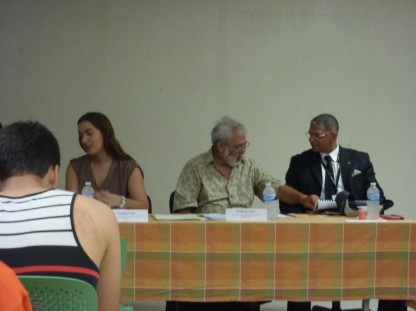By: Natalie Castro
The uneven income distribution, unemployment, and school dropout rates are some of the factors that contribute to the social inequality in Puerto Rico, said Natalia Vilá, University of Puerto Rico- Mayagüez student and president of the Student Association in Support of the Puerto Rican Communities, during a press conference on October 29, 2013.

Natalie Castro, moderator, facing the audience during the press conference held in the Carlos Chardón Building on October 29, 2013
Among the panelists, there was Agent Carlos Ruíz, former policeman in the Narcotics, Drugs, and Illegal Arms Division of Mayagüez, Dr. Wilfredo Ruíz- Oliveras, founding member and ex- professor of the Economy Department at the UPRM, and Natalia Vilá.

The press conference included three panelists: Natalia Vilá, Dr. Wilfredo Olivera, and Agent Carlos Ruiz.
The press conference was held in the Carlos Chardon Building of the UPRM, at 10:30 a.m. They discussed issues related to the economic crisis and social inequality in Puerto Rico, as well as topics related to the underground economy, the current state of the Puerto Rican economy, and the special communities of the island.
“Damn politics! That’s the main factor that contributes to the social inequality here,” said Agent Ruíz. “Politicians forget about the people of Puerto Rico and do not know how to manage the people’s money.”
On the other hand, Dr. Ruíz- Oliveras added that “Puerto Rico’s social inequality is a direct result of the economic issues of the island.”
A Huffington Post article published on September 7, 2013 notes that Puerto Rico’s homeless population is on the rise. Dr. Ruíz attributed this to the economic instability of the island but added that “many people are homeless by choice.”
Throughout the press conference, the panelists gave some tips on how to improve the economy and social inequality in Puerto Rico.
In order to improve Puerto Rico’s economy Ruíz recommends creating “a national plan that identifies the most lucrative sectors of the economy.” He added that “the government should encourage the well-educated to stay on the island.”
On the other hand, for Vilá, the solution is for the government to invest in projects that have long-term effects, such as education, which could have wider, multiplying effects.” “To provide money to people for spending on food, energy, and water is not bad, but it’s not the best way to invest in the future.” Vilá said.
According to John Mario, in an article published by the Caribbean Business of February 18, 2013, another solution would be to create an equitable economy. “Societies with high levels of economic inequality are more likely to fall into financial crisis…”
Panelists also addressed the role of the underground economy in Puerto Rico’s current economic situation. Agent Ruiz and Dr. Ruíz- Oliveras both noted that this is one of the aspects that drives the country’s economy. “The underground economy includes all economic activity that isn’t registered under the Gross Domestic Product, such as drug selling, contraband, and piracy,” said Dr. Ruíz.
The factors that influence a person’s entering the underground economy were also addressed.
“Economic inequality and the urge to acquire material ‘things’ are the main reasons for entering the underground economy,” said Agent Ruíz. “It is unfair to judge someone by the way he looks or by the music he listens, a person’s entering to the underground economy has more to do with the economic instability of a person, he added.”
However, as Agent Ruíz, said: “Without the underground economy there wouldn’t be a lot of jobs in the judicial branch of Puerto Rico. The use of drugs pays the jobs of many. The government pays the cops to investigate the crime, the prosecutor to imprison the person, the judge to make the final decision, and the attorneys to defend the criminal. It is a cycle, therefore it is not convenient to legalize any drug.”
Panelists highlighted during the press conference that an alarming 45 percent of Puerto Ricans live under the Poverty Index. Also, 322 of Puerto Rico’s communities are being marginalized. Vilá explained that “A marginalized community lives under the Poverty Index, depends on government aids, has a high rate of unemployment, and people with little education.”
To help the marginalized communities in Puerto Rico, the UPRM community suggested the foundation of the Student Association in Support of the Puerto Rican Communities, which Vilá presides. The association goals are: provide access to a better education, help address the problem of school dropouts, and create community programs that a have a lasting impact.
